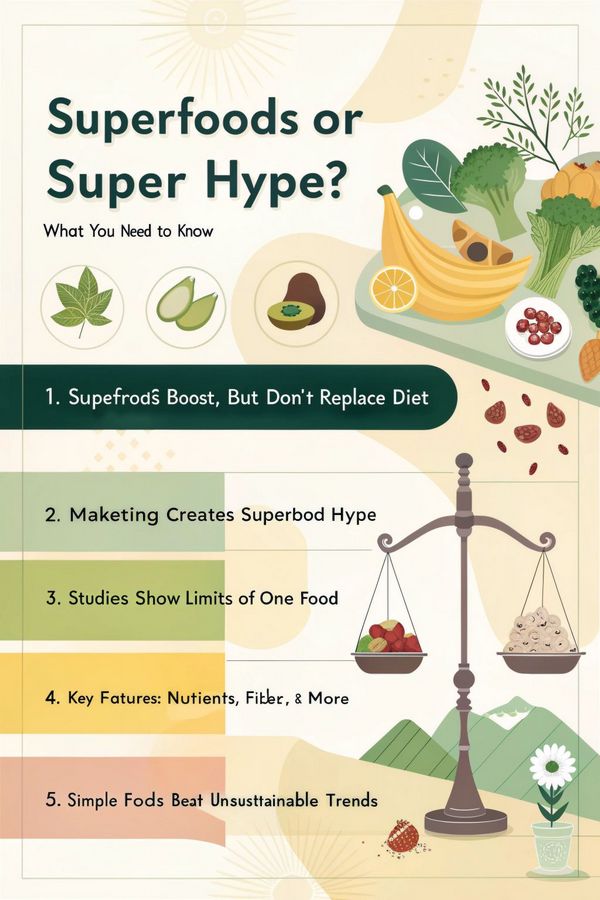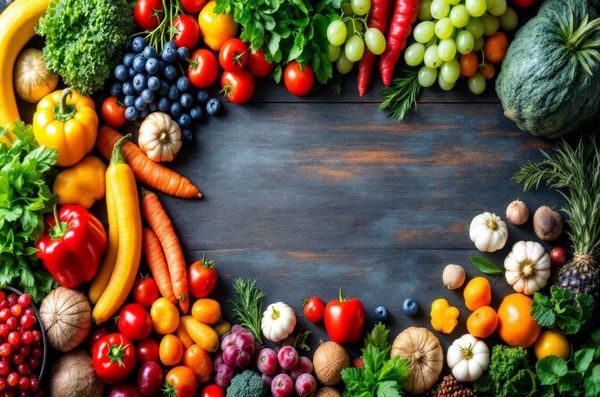Are “superfoods” really the secret to better health, or just a clever way to sell trendy foods? Many people feel confused about what’s truly good for their bodies. With so much information out there, it’s hard to know which foods actually make a difference.
Superfoods are often praised for being full of vitamins, minerals, and other nutrients. They are said to improve health in big ways. But is this backed by science—or just hype?
This blog will break it all down for you: what superfoods are, their actual benefits (or lack of), and how marketing shapes our views on them. Get ready for the truth!
Defining Superfoods
Superfoods are foods with a high amount of nutrients. They are praised for their possible health benefits.
Common Characteristics of Superfoods
Some foods are called superfoods because they are full of nutrients. They are known for being healthy and may prevent diseases.
- Rich in Nutrients
These foods have high levels of vitamins, minerals, and antioxidants. Examples include kale, blueberries, and salmon. - Packed with Antioxidants
Superfoods contain compounds that fight cell damage caused by free radicals. Dark chocolate and spinach are good sources. - Good Fats
Foods like avocados and nuts have monounsaturated fatty acids or omega fatty acids, which support heart health. - High in Fiber
Foods such as quinoa and chia seeds help with digestion and keep you full longer. - Low in Calories
They provide lots of nutrients without adding too many calories to your diet—like berries or broccoli. - Linked to Disease Prevention
Some studies suggest superfoods might lower the risk of chronic illnesses like heart disease or diabetes. - Natural Energy Boosters
Superfoods like bananas or oats can give a quick energy lift due to their nutrient-dense makeup. - Easy to Add to Meals
Many superfoods are versatile, making them simple additions to smoothies, salads, or snacks.
The Main Superfoods Benefits

Superfoods are often praised for their nutrients, but how much of it is backed by science? Keep reading to see what research says!
Nutritional Benefits and Claims
Nutrient-dense foods like kale, blueberries, and salmon are packed with vitamins, minerals, and antioxidants. These healthful foods can contribute to disease prevention and overall well-being.
Foods high in fiber improve digestion, while those rich in omega fatty acids support heart health.
Some superfood trends focus on specific benefits. For example, nuts with monounsaturated fatty acids help lower bad cholesterol. Foods rich in antioxidants may reduce cell damage caused by free radicals.
While nutritious foods offer significant health benefits, their impact varies based on diet and lifestyle choices.
Read This Also: The Benefits of Walking: Why It’s the Most Underrated Exercise
Scientific Support and Skepticism
Some research supports superfoods for their high levels of nutrients. Foods like berries, nuts, and salmon are rich in antioxidants, omega fatty acids, and vitamins. These can help fight diseases and improve health.
But many scientists question the “superfood” label itself.
There is no regulated definition for a superfood. Experts argue that eating one food won’t fix poor diets or prevent disease alone. A balanced diet with many nutrient-dense foods may be more effective than focusing on specific “healthful” items promoted by marketing trends.
Marketing vs. Reality

Marketing makes superfoods sound magical—but are they really all that special? Keep reading to learn more!
The Role of Marketing in Promoting Superfoods
Brands use clever ads and packaging to sell superfoods. They focus on health benefits like high nutrients, antioxidants, and omega fatty acids. Bright labels shout “packed with vitamins” or “rich in minerals.” These claims grab attention fast.
Social media plays a big role too. Influencers post about superfood smoothies or bowls topped with chia seeds. This makes the foods look trendy and must-have for healthy eating. Yet, there’s no clear rule on what counts as a superfood—much of it is hype.
Consumer Perception and Misconceptions
Many people think superfoods are magic solutions for better health. They see food labels full of words like “nutrient-dense” or “packed with antioxidants” and assume instant benefits.
Some expect drastic changes in energy, weight, or disease prevention after eating these foods.
There is no official definition for superfoods. This leads to confusion about what qualifies. People often overlook that a single food cannot fix poor dietary choices alone. Eating healthy requires balance, not just focusing on trendy options like kale or chia seeds.
Superfood myths can mislead consumers into spending more without guaranteed results.
Conclusion
Superfoods sound exciting, but they aren’t magic. They do have nutrients that may help your health. Still, eating a balanced diet matters more than chasing trends. Be mindful of marketing claims and choose foods that truly nourish you.
Healthy eating should be simple and sustainable!
Frequently Asked Questions (FAQs)
1. What are superfoods?
Superfoods are foods packed with nutrients like vitamins, minerals, or antioxidants. They’re often said to boost health and energy.
2. Are superfoods really that special?
Not always! Some claims about superfoods can be more hype than fact. Eating a balanced diet is still the best way to stay healthy.
3. Do I need expensive superfoods in my diet?
Nope—you don’t have to spend a lot on trendy foods. Everyday options like spinach, blueberries, or oats can offer similar benefits without the price tag.
4. How do I know if a superfood is worth it?
Look at the science behind it! Check for real studies instead of just marketing claims (and remember—no single food works magic).

